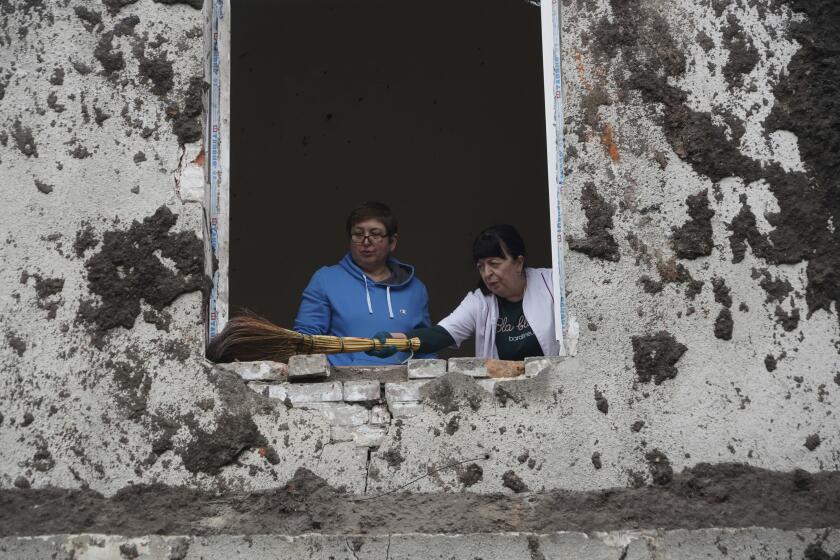Negroponte shift is ruffling feathers
The abrupt departure of John D. Negroponte as the nation’s spy chief prompted angry responses from Capitol Hill and triggered new debate Thursday over whether a position created to fix the nation’s intelligence problems is itself fundamentally flawed.
President Bush is expected to announce today that Negroponte will become the top deputy at the State Department. Bush also is set to nominate retired Navy Vice Adm. J. Michael McConnell to be the next director of national intelligence.
The shuffle comes 18 months into Negroponte’s tenure at the job. And though he has received mixed reviews for his reform efforts, lawmakers and senior intelligence officials said the switch was a significant setback for the office, which oversees the 16 U.S. intelligence agencies, including the CIA.
“I’m very concerned that taking out the top guy at a critical juncture is going to cause some backsliding,” said Rep. Jane Harman of Venice, who was the senior Democrat on the Intelligence Committee when Congress passed the legislation creating the post of director of national intelligence. “It’s a very steep learning curve. And any new person will have to play catch-up.”
Negroponte’s departure is the second major exit from the office of the directorate in a matter of months. His top deputy, Air Force Gen. Michael V. Hayden, left in the spring to become CIA director. When Negroponte and Hayden were nominated for the intelligence posts in 2005, they were described as a team whose skills and expertise were indispensable to the success of establishing the new agency and enacting sweeping intelligence changes passed in 2004 by Congress.
“I’m disappointed that both he and Hayden have left,” said Lee H. Hamilton, a member of the Sept. 11 commission, which designated the creation of a intelligence director one of its principal recommendations.
“I think we are beginning to see better sharing of information in the intelligence community, and I also think it’s a work in progress and an awful lot needs to be done,” Hamilton said. “It is therefore a little unsettling to me that your two top leaders move out of the DNI office within a matter of months.” The deputy job held by Hayden remains unfilled.
In another of a series of moves among top foreign policy posts, officials said Bush was likely to nominate Zalmay Khalilzad, U.S. ambassador to Iraq, as U.S. ambassador to the United Nations. Khalilzad would replace John R. Bolton, who resigned last month after serving 16 months as a Bush appointee but not winning Senate confirmation to remain in the job.
The U.N. move could be logical for Khalilzad, who has been ambassador to Iraq since June 2005. Bush is expected to announce a new plan for Iraq. Khalilzad has faced increasing tension with the Shiite leadership of the government, which has sometimes complained that he has gone too far in pushing for the interests of the country’s Sunni minority.
Negroponte’s departure as national intelligence director has been rumored for weeks, and officials close to him have said that the career diplomat is eager to return to the State Department, particularly in such a senior role. Negroponte is expected to play a leading role in revamping the State Department’s Iraq policy by putting more pressure on the fledgling government there and enlisting more help from regional allies.
Intelligence veterans said it was clear that Negroponte had been chafing under the limitations of his position as intelligence chief. Though the job was created to coordinate the activities of the nation’s spy agencies and improve communication among them, it lacks complete authority over those agencies’ operations, personnel and budgets.
“He’s in charge of everything and in charge of nothing,” said Richard J. Kerr, a former CIA deputy director. “He has a whole bunch of independent organizations he’s trying to get to work together -- a lot by persuasion and some by coercion.”
Kerr said that was partly why others, including new Defense Secretary Robert M. Gates, had previously spurned the position.
Negroponte was credited with improving the flow of information among spy agencies, and with winning several budget showdowns with the Pentagon over spending on spy satellites and other classified programs.
New Senate Intelligence Committee Chairman John D. Rockefeller IV (D-W.Va.) said Negroponte was essentially walking out on an unfinished job. “I am deeply troubled by the timing of this announcement and the void of leadership at the top of our intelligence community,” said Rockefeller, who announced hearings this month focusing partly on intelligence reform.
Negroponte was criticized by members of the Sept. 11 commission, among others, for creating a new intelligence bureaucracy, with about 1,500 employees in the national intelligence office.
The Bush administration’s plan to replace Negroponte with a retired naval officer prompted concern among some lawmakers that the intelligence community would be dominated by the military. McConnell was the military’s top intelligence officer during the 1991 Persian Gulf War, and subsequently became National Security Agency director.
The top jobs at the CIA and NSA, as well as other agencies, are held by military officers.
“If it’s McConnell [for director of national intelligence], it’s one more uniform,” Rep. Harman said, adding that it raised “at least a question mark about the military takeover of our intelligence organizations.”
Kerr, the former CIA deputy director, voiced similar concerns, saying that civilian leadership of intelligence organizations was particularly important now because of the wars in Iraq and Afghanistan. “The military can get themselves so committed to the mission that their objectivity at times can be less than it should be,” he said.
Times staff writer Paul Richter in Washington contributed to this report.
More to Read
Start your day right
Sign up for Essential California for news, features and recommendations from the L.A. Times and beyond in your inbox six days a week.
You may occasionally receive promotional content from the Los Angeles Times.






